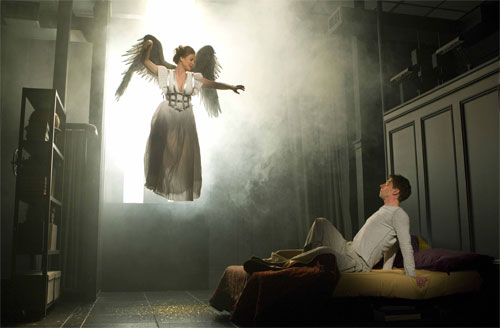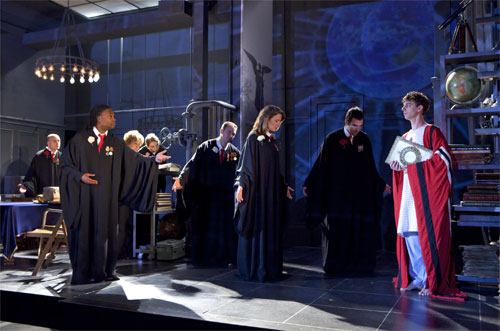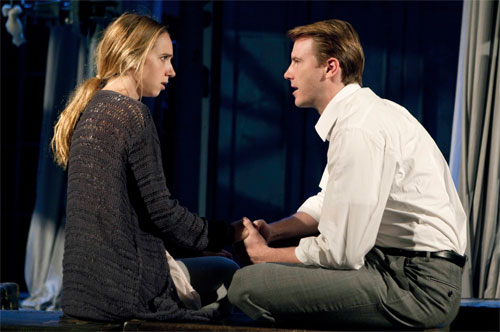
Robin Wegert as The Angel and Christian Borle as Prior Walter. (C) Joan Marcus.
For almost every night for the next four months, 160 lucky people will get to experience the total engagement in the lives of people not 20 yards from them whom they've never met before but whom they come to know utterly, and completely, mere hours later, in all their passion and despair.
Angels in America has returned, this time to the intimate Signature Theater, 11 years after the millennium when history was going to crack open, according to Tony Kushner, the by-now infamous playwright, sage, pundit, wit and talking head.
Has it? The play, which pre-dates the age of the internet, is all the more moving for its expression of collectivity of humanity. You can't change the world directly by writing a play, says Kushner in an online interview. Yet Angels makes clear that art can be transformative. All six plus hours of it displaying the violent interstices between disease and treatment, longing and commitment, and truth and betrayal make you hold your breath in fear that the characters will hurt each other even more than the disease of AIDS, which triggered it, ever could. Justice and democracy are simple, says Prior Walter, who is diagnosed with AIDS at the outset. Love is hard.
Though the play uses the disease as a point of departure, it delves deeply into the fears of society about gay men and those they have about themselves--coming out into your own true self is excruciating whether you are gay or straight or purple. But no sex act should mete such punishment.
Kushner writes that America is a "melting pot where nothing melted." Even though AIDS is somewhat under control (only in the western world, not in the third world), life can still be frightening for gay citizens in 2010. They can't make binding commitments to the ones they love. They can't tell the military they are gay. They can't be in dorm rooms and conduct their private lives. They can't walk on the street without fear.
History may have cracked open, but not in the way we thought it would.
It must be said that Part 2, Perestroika, which Kushner has re-written in an attempt to bring the State of Gay up to the present day, goes didactic the way Part 1, Millennium Approaches, does not, and is less evanescent as a result.
Still, Michael Greif, the director, says people came in to audition for this play who normally might not have because it's open to a variety of interpretations, and there's room for actors to bring their idiosyncrasies to the characters.

The cast. (C) Richard Termine.
It cannot have escaped him and Kushner when they set out to cast this revival that Zoe Kazan was supremely ready to take on the role of Harper after a short but dense career that has passion as its unifying theme. In a uniformly strong cast, Kazan is like an Angel in America, carrying the torch of truth and reconciliation to the next generation.
Twenty-seven-year-old Kazan plays the mad Mormon housewife, a Valium addict who suffers from rejection by her closeted husband Joe (Bill Heck) and consequent delusions that there are people with knives under the bed. Really it's just her husband on top of the bed without an erection. Some of her most engaging scenes are those where her hallucinations and Prior Walter's (Christian Borle), the young gay man whose august lineage cannot protect him from the disease, meet in a pre-internet virtual-ville of ailing souls. "Respect the delicate ecology of your delusions," writes Kushner.
A marvelously personal recent documentary by Marty Scorcese about Elia Kazan, Zoe's grandfather, made clear that leaving our roots, be they Greek, Mormon, Italian--or heterosexual--can be earth-shattering.
Kazan took time between the demanding performances to answer some questions about her own journey to the play.

Zoe Kazan as Harper Pitt and Bill Heck as Joe Pitt. (C) Joan Marcus.
Q: Your name is Zoe Swicord Kazan. Your parents are both writer-directors besides being very private homebodies who love to garden and tinker. Though your father's family is the more famous your mother's southern roots are storied as well. Can you tell me if nature or nurture has had more to do with your professional formation and how having two creatively ambitious parents has made a difference?
A: Seriously, nature and nurture, who can tell them apart? I was born with certain traits: an overwhelming imagination (just ask my mother about my litany of childhood fears), an over-ripe emotional life, an appetite for language... And then there's the rest of it. Do I think it helped that my parents read to me and gave me access to great plays and movies and that when I told stories they listened? Yes. Did having working artists as parents encourage me to think it was possible for me to do the same? Definitely. Was it everything? Who knows. I am their child, for better or worse--and believe me, when I was a 14-year-old nerd writing poetry and playing Barbies, I thought it was for worse. Q: In Angels you are a leading lady albeit in an ensemble piece. You were only 7 when Angels was first workshopped at the Taper in LA. Did you shy away from seeing what anyone else has done with the role of Harper? What in your life or formation has brought you to her, a young Mormon newlywed struggling to understand her husband's sexual withdrawal from her in the most intimate terms, stuck inside her apartment and her own mind?
A: My first exposure to Angels was on the page, and there was something very private about my experience of reading the plays. When I saw the HBO version, although I admired the performances, it felt almost like an intrusion on the world I had pictured. So when I was cast, I did avoid watching any footage of old productions in order to preserve my personal connection to Harper.
The facts of Harper and the facts of me--where we come from, the circumstances we're living in--couldn't be more different, but there is something at the heart of her that feels intensely personal to me. Her love of language, her humor, even her loneliness; these all spoke to me. And, without going into detail, there have been times in my life when I have had to survive real pain and trauma, and what saved me is the same as what I think saves Harper: the power and joy of the imagination.
Q: I've seen you be an excitable Masha in The Seagull on Broadway and a seductive but inexperienced Maureen in the film Revolutionary Road--two memorable, very different performances. The obvious question, does theater inform the film (and vice versa), should be coupled with, what different kinds of characters does theater or film allow you to play and do you prefer one to the other?
A: The simplest answer to that question is that the economics of film are such that the juiciest, most interesting roles usually go to people much more famous than me. There are exceptions, of course, but for now I'm finding more challenging and interesting work onstage. And there is the benefit theater allows of working on a role for months. But to answer the first part of your question, I think the difference between what an actor does onscreen versus onstage is elided in a space as small as the Signature's. What we're doing is not quite at a filmic level of intimacy, but it is much closer to that than what you might do on a big Broadway stage.
Q: You are also a playwright. Is this ultimately the goal?
A: Not the goal, no; I am an actor first and foremost. But... I avoided writing for a long time, probably out of a feeling that it was my parents' terrain. Then when I started to write, it was entirely for my own pleasure, a private place to retreat to when I was tired of being scrutinized onstage or on set--or an outlet when I wasn't working. And now I'm working on my third play and my second screenplay and I'm getting paid for my work...and it's starting to feel more central to my life. I still feel funny saying "I'm a writer" but when I don't have time to write--or like now, when I'm too engrossed in a part to think about other things--I miss it terribly. We'll see.
Q: Vilifying, maiming and baiting gays, don't ask, don't tell, gay marriage and alas gay suicide are much back in the public's consciousness. Did you have gay friends growing up who experienced the torments of coming out to their families? Angels in America was first electrifying because it both reflected on and became part of the national conversation about being gay, and AIDS. You come from a generation which has been characterized as somewhat removed from political activism. As an actress and writer, do you feel the responsibility to engage in political action or is choosing your work a political act in and of itself? Will your generation come to see the play and why should they?
A: Wow, that's a big question. First of all, I have to say I think my generation has been maligned by being characterized as politically inactive. I have hundreds of friends and acquaintances who dropped everything to volunteer on the Obama campaign--and that is just one example of the ways in which people my age (and younger) are politically conscious. For one, I think my generation is more forward thinking when it comes to issues of sexuality than any generation before us. Don't get me wrong, the activism of every civil rights movement of the last two centuries has paved the way for this greater open-mindedness, and we have an enormous responsibility to act on this awareness (rather than simply being self-congratulatory for possessing it). Personally, I don't know that I do enough for the causes I feel passionate about, but I try to uphold my political beliefs in my day to day life--by turning down auditions for projects that promote negative depictions of women or of the LGBT community, for instance. Being in this play has provided more opportunities for engagement; several members of our cast recorded something for the Trevor Project, and we participated in a fund-raiser for Congressman Patrick Murphy, who was an early supporter of revoking "Don't Ask Don't Tell" and is running for reelection in Bucks County. But as Tony wrote, "The Great Work Begins." I take that very much as a call to action, and I hope the young people in our audience do as well.
A few tickets remain towards the end of the run in February. Check www.signaturetheater.org for updates.
